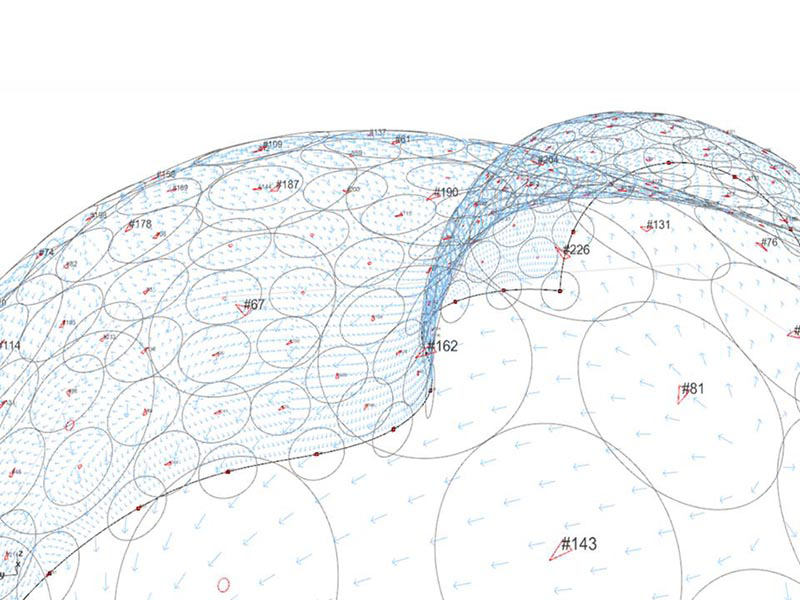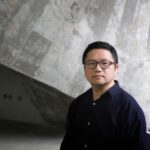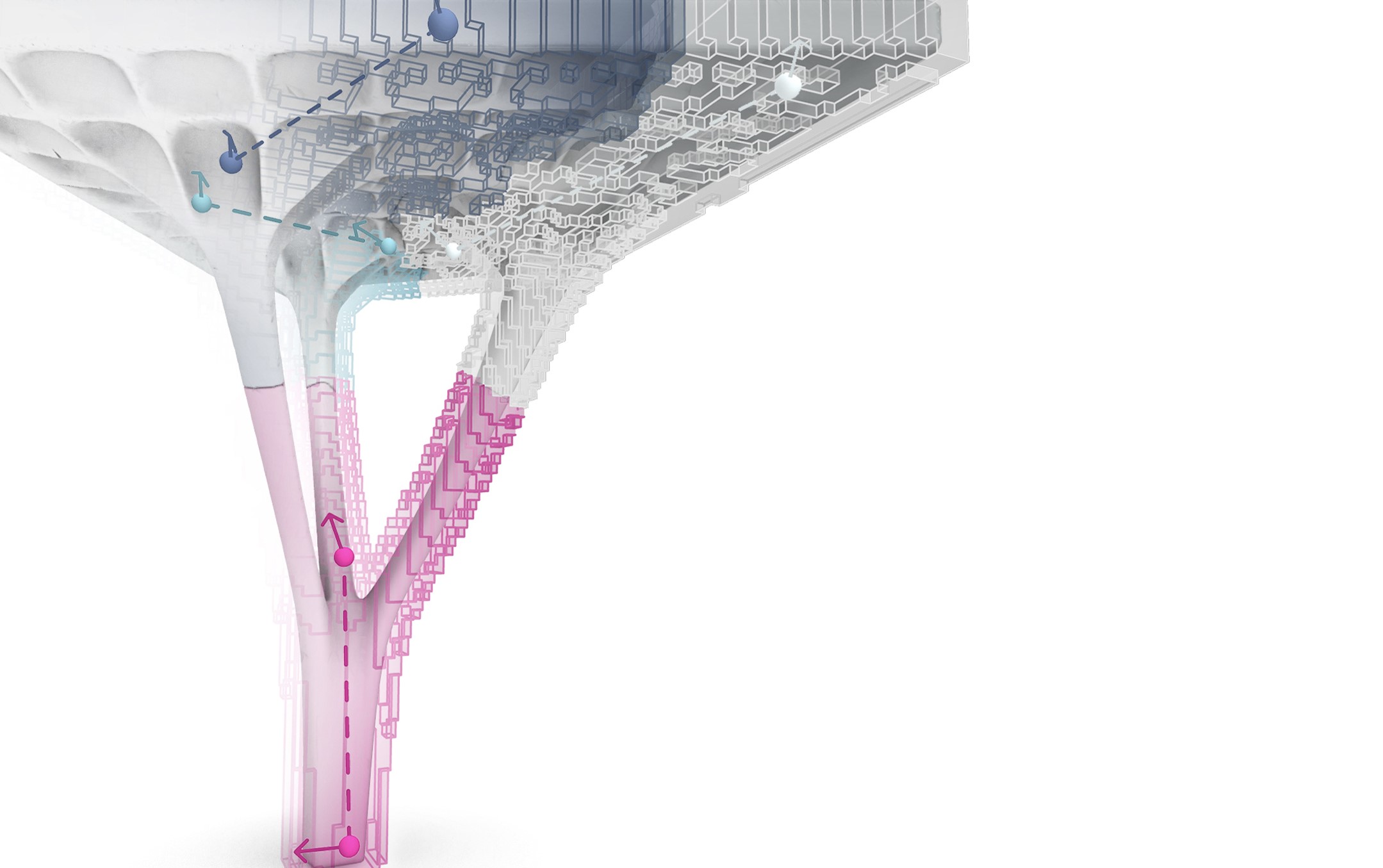
Description:
Required Skills: Advanced Grasshopper, programming skills with C# or Python
Required Software: Windows, Rhinoceros/Grasshopper, Visual Studio Community
Required Hardware: PC or Laptop
Maximum number of participating students: 100
In this workshop, participants will learn about the theoretical concepts of agent-based modelling and simulation (ABMS) and how to apply those to materialization-informed architectural design. The particular relevance of ABMS to architecture lies in its ability to integrate many – potentially conflicting – design criteria, such as structural or fabrication-related constraints. This can be achieved by endowing the constituent units of the architectural system under investigation with decision-making agency. These units (i.e., agents) exhibit distinct behaviors that encapsulate low-level design intentions, based on which agents interact with one another and their environment. In doing so, they negotiate and iteratively integrate their associated design intentions on the unit-level, eventually leading to highly differentiated and informed architectural conditions on the building-level.
In the first half of the workshop, participants will be familiarized with the conceptual and methodological implications of translating architectural systems to agent systems, as well as design intentions to agent behaviors. This will involve both expert lectures and hands-on tutorials using Rhino/Grasshopper. Participants will also be introduced to ICD’s interactive agent-based modeling framework, by means of which they will have the opportunity to augment and extend an architectural agent model provided by the instructors.
The workshop will conclude with a diverse set of agent behaviors and thus architectural variations of the provided case study, showcasing the potentials that arise from bottom-up, behavior-based design processes. Selected outcomes will be tested through the construction of a full-scale demonstrator at Tongji University. After participation students will have a comprehensive understanding of ABMS and its application to architectural design.
Schedule:
timezone: (GMT +2:00) Kaliningrad, South Africa| Start time | End time | Description |
|---|---|---|
| 2022-06-26 - 10:00 | 2022-06-26 - 16:00 | Introduction to coursework, ABM lecture, tutorial session |
| 2022-06-27 - 10:00 | 2022-06-27 - 16:00 | Advanced ABM concepts (lecture), tutorial session |
| 2022-06-28 - 10:00 | 2022-06-28 - 16:00 | ABM research at ICD (lecture), tutorial session |
| 2022-06-29 - 10:00 | 2022-06-29 - 16:00 | Concept presentations |
| 2022-06-30 - 10:00 | 2022-06-30 - 16:00 | Support session |
| 2022-07-01 - 10:00 | 2022-07-01 - 16:00 | Support session |
| 2022-07-02 - 10:00 | 2022-07-02 - 16:00 | Final presentations |
Instructors:
 |
Achim Menges | Achim Menges is a registered architect in Frankfurt and full professor at the University of Stuttgart, where he is the founding director of the Institute for Computational Design and Construction (ICD) and the director of the Cluster of Excellence Integrative Computational Design and Construction for Architecture (IntCDC). In addition, he has been Visiting Professor in Architecture at Harvard University’s Graduate School of Design and held multiple other visiting professorships in Europe and the United States. He graduated with honours from the Architectural Association, AA School of Architecture in London, where he subsequently taught as Studio Master and Unit Master in the AA Graduate School and the AA Diploma School. |
 |
Philip F. Yuan | Philip F. Yuan Associate Dean, professor of the College of Architecture and Urban Planning (CAUP) at Tongji University. He is also Thomas Jefferson professor at University of Virginia (UVA, 2019) and the visiting professor at Massachusetts Institute of Technology (MIT, 2019) and Royal Melbourne Institute of Technology (RMIT, 2021). Yuan founded DigitalFUTURES Assocation in 2011. He plays a leading role in the Frontiers of digital architecture. His research focues on the realm of computational design and robotic fabrication. His works have been collected by Moma New York, M+ Hongkong and Centre National d'art et de Culture Georges Pompidou. He has also participated in Venice biennale, Chic |
 |
Fabian Kannenberg | Fabian Kannenberg is a research associate at the Institute for Computational Design and Construction (ICD) at the University of Stuttgart, where he also received his Master of Science from the Integrative Technologies and Architectural Design Research (ITECH) program. His current research at ICD is affiliated with the Cluster of Excellence Integrative Computational Design and Construction for Architecture (IntCDC). Within this framework, he develops computational design methods for high-performance fiber composite building systems. |
 |
Mathias Maierhofer | Mathias Maierhofer is a researcher, interested in exploring how adaptivity in architecture enables new ways of conceiving, designing and operating our built environment. He is a research associate at the Institute for Computational Design and Construction (ICD) at the University of Stuttgart, where he is also involved in teaching graduate students within the ‘Integrative Technologies and Architectural Design Research’ (ITECH) M.Sc. Programme. Prior to joining ICD, Mathias worked as an architect in Austria and the Netherlands. He holds a bachelor’s degree in architecture from Vienna University of Technology as well as a master’s degree with distinction from the ITECH Master program at the University of Stuttgart. |
 |
Luis Orozco | Luis Orozco is a Research Associate and PhD Candidate at the Institute for Computational Design and Construction (ICD) at the University of Stuttgart, Germany. He is also a registered architect in the state of New York, USA. Luis received his M.Arch from the Taubman College at the University of Michigan, USA, where he instituted and taught the university’s first Introduction to Robotic Fabrication course. He received his B.Sc.Arch. at McGill University, Canada. His research focuses on a novel, digital, modular wood building system to enable the adoption of prefabricated timber construction in additional building typologies. |
 |
Tobias Schwinn | Tobias Schwinn is a senior researcher at the Institute for Computational Design and Construction (ICD), University of Stuttgart, Germany. In research and teaching, he is focusing on behavior-based approaches for integrating robotic fabrication and computational design processes within the context of segmented shell structures. He is one of the founding members and currently leader of ICD's "Agent-based Modeling and Simulation" research group, which unites diverse research areas, such as design of adaptive buildings, fabrication-oriented design of modular concrete structures, design of segmented timber floor and roof systems, and distributed robotics. |
 |
David Stieler | David Stieler is a Research Associate at the Institute for Computational Design and Construction (ICD) at the University of Stuttgart. His research, which is affiliated to the nation-wide SPP 2187 "Adaptive Modular Construction with Flow Production Methods", is focused on the application of agent-based modelling techniques on material and production systems for pre-fab concrete construction. Through the introduction of learning techniques to multi-agent systems, this research seeks to liquefy the segmented character of current design procedures in the field of prefabricated concrete construction. |
 |
Max Zorn | Max Zorn is a research associate at the Institute for Computational Design (ICD) at the University of Stuttgart. Max studied Architecture at Technical University Munich, and University of Illinois at Urbana Champaign and Integrative Technologies and Architectural Design Research (ITECH) at the University of Stuttgart. He holds a BA (TUM) in Architecture and a MSc in ITECH. During his studies, Max developed a deep interest in modeling and simulating architectural systems to increase building performance and personal comfort. His research focuses on interactive, multivariate visualization tools for design space exploration of architectural design optimization. Max joined the developer team of Opossum and is involved in the development of the ICD.AbmFramework. |
 |
Hua Chai | Hua Chai is a Postdoctoral researcher at the College of Architecture and Urban Planning (CAUP) of Tongji University. He received his Ph.D from Tongji University in 2022. He visited the Institute for Computational Design and Construction (ICD) at the University of Stuttgart for one year as guest researcher In 2020. His research focuses on computational design and robotic fabrication in timber structures, especially the development of robotic platforms and technologies for complex construction systems. He has been involved in leading several international workshops on n including DigitalFUTURES 2020-2021 and ACADIA 2020. |
Disclaimer:
All workshops will accept 100 applications MAX.

